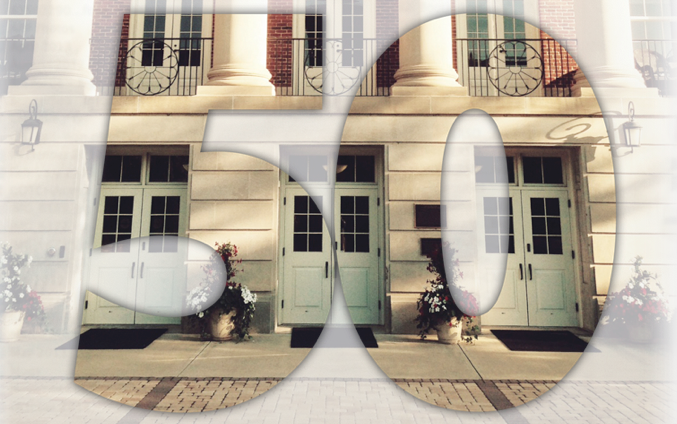History has a habit of colliding with the doors of Foster Auditorium, but Tuesday it passed easily through the doors and into the auditorium.
Brenda Marshall remembers the determination of her brother, James Hood, 50 years ago, when he fought to enter the doors as a student at The University of Alabama.
“It was, as they say, a giant step for man,” she said. “I was afraid for my brother, but I knew if anyone could do it, he could. When he got determined to do something, nothing could stop him. That’s how he was.”
Tuesday’s commemoration honored Hood and Vivian Malone, the other student at the center of the Stand in the Schoolhouse Door. The event also honored their fellow pioneers – students who helped integrate the state’s flagship university. Speakers, musical guests and UA President Judy Bonner presented, reflected and honored those who demonstrated “courage, change and progress” in history.
Tyler Merriweather, a sophomore and first-generation college student, spoke on courage, while adding personal parallels from his past and present with the Boys and Girls Club of America, which he represented at the White House as the Southeast Member of the Year. He said a personal narrative added realism and relatable elements to the discussion.
“I believe [storytelling is] the only way to talk about courage, change and progress,” he said.
Merriweather also expressed a desire to extend the legacy of his own family, which is known for its work in the community.
“Now is my time to live their dream,” he said.
Zaneta Lowe, a Birmingham, Ala., journalist and alumna, traced the effect of change through the generations, discussing her parents’ time at the University and its relation to that of her and her husband, whom she met during her time at the Capstone.
Andre Taylor, the first black president of the University’s National Alumni Association, discussed the idea of progress, moving it beyond the “elements” of numbers and achievements and into the overall transformation of the institution into an ideal educational community.
President Bonner, who was cited throughout as an example of another door opened for women, spoke of a desire to make certain the University was a “great place for people to learn.”
“[My goal is] creating an environment where you can be successful,” she said.
The final speaker, Judge John England, also a UA alumnus, was tasked with speaking on the next 50 years. He challenged those listening to not only open doors, but walk through them. England, whose three children also graduated from the University’s law school, drew laughter by expressing his desire for the University’s president to invite him back in 2063.
Throughout the program, musical performances helped communicate the messages in the program. Noel Engebretson, a professor of piano, opened the evening with Mussorgsky’s “The Great Gate of Kiev,” describing the falling of prohibitive gates.
“I thought the symbolism of the gates having fallen was fitting,” he said. “The school doors are no longer blocked.”
Engebretson said music was a universal way of communicating, and the performance was his way of sincerely expressing how much he was affected by the change.
“I couldn’t be happier,” he said. “This is something I consider a great leap forward.”
The piece, which he personally suggested as an addition to the program, is celebratory.
“There’s strength and beauty to behold as well,” he said.
Engebretson, who grew up in Minnesota, remembers cheering on Hood and Malone as a teen.
“I was very happy when the gates came crashing down,” he said. “There’s been a great evolution. That pleases me a lot.”
Joshua Williams, a senior studying horn performance, performed a Strauss Nocturne on the French horn.
“When I was younger, this was something we studied at school. Vivian Malone and James Hood seemed larger than life,” he said. “Things happen in the world today that make us lose hope, and this [event] shows the progress and change we’ve made as a country.”
Everett McCorvey, a singer and University alumnus, provided four songs with the accompaniment of Tedrin Blair Lindsay of the University of Kentucky. The set, which drew from the influence of famed gospel singers like Marian Anderson and Cedric Dent, touched on many of the spiritual themes underlying the civil rights movement.
“That’s black history – music. That’s how we got over,” Marshall said. “[Faith is] number one. You had to have the faith. That was one thing Vivian and my brother had. It was faith that they stepped out on. They had the Lord in them, and they knew the Lord.”
After the program, attendees stepped out past the doors – currently mounted on display – that kept out Hood and Malone and onto the Malone-Hood Plaza, where the Autherine Lucy Clock Tower stands, honoring another of the University’s first black students.
The tower’s dedication in 2010 was one of the most recent times history brought Marshall, who lost her brother in January of this year, to campus.
“To be a part of that [and] to walk out and look at that, it’s some kind of terrific,” she said.









